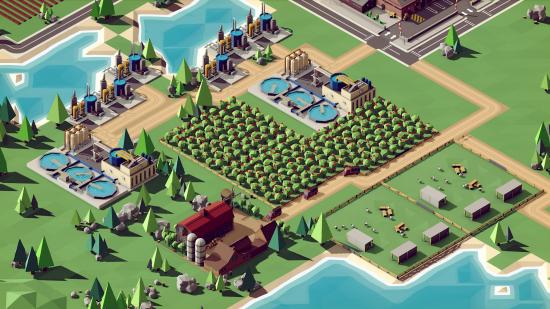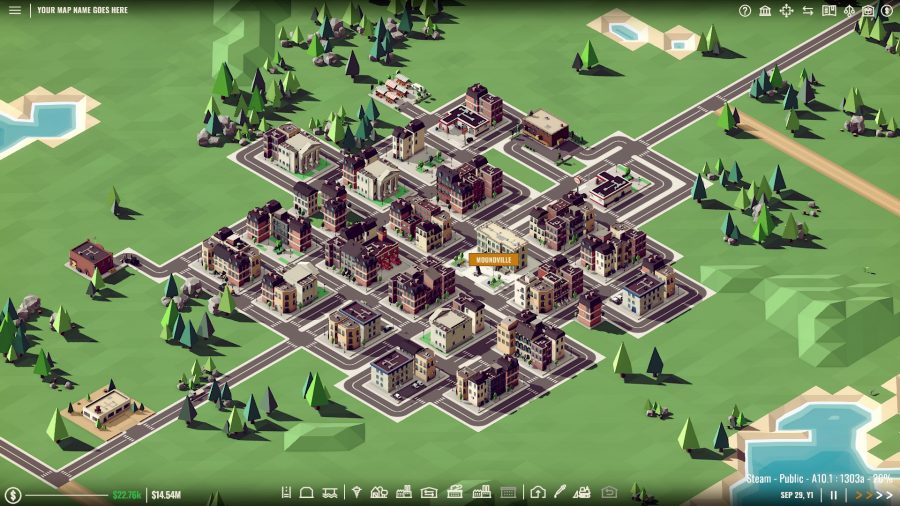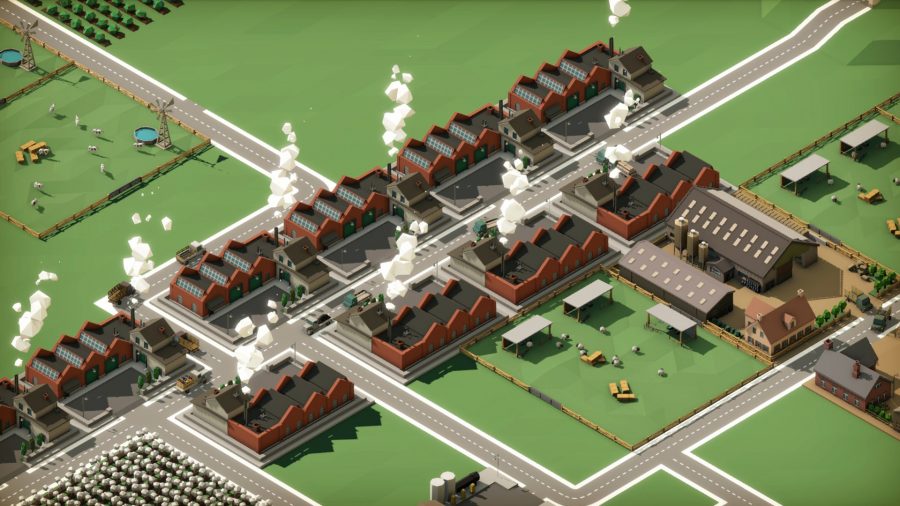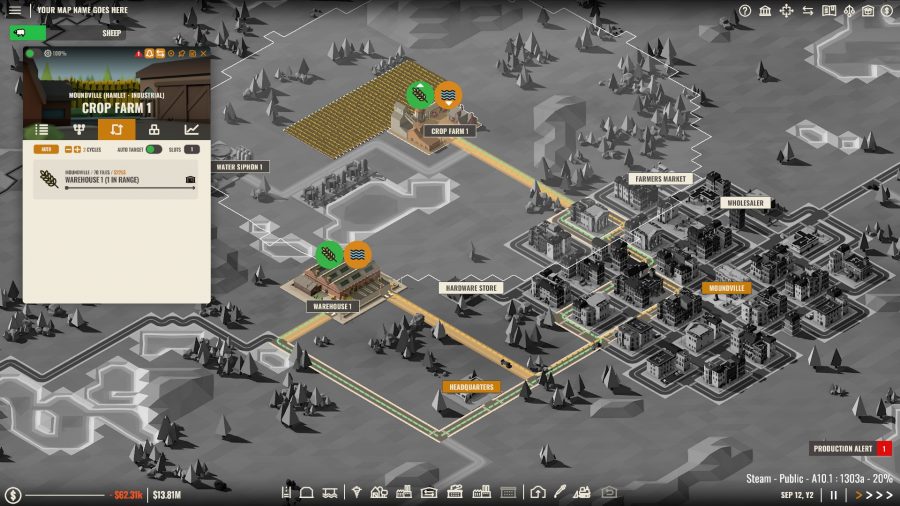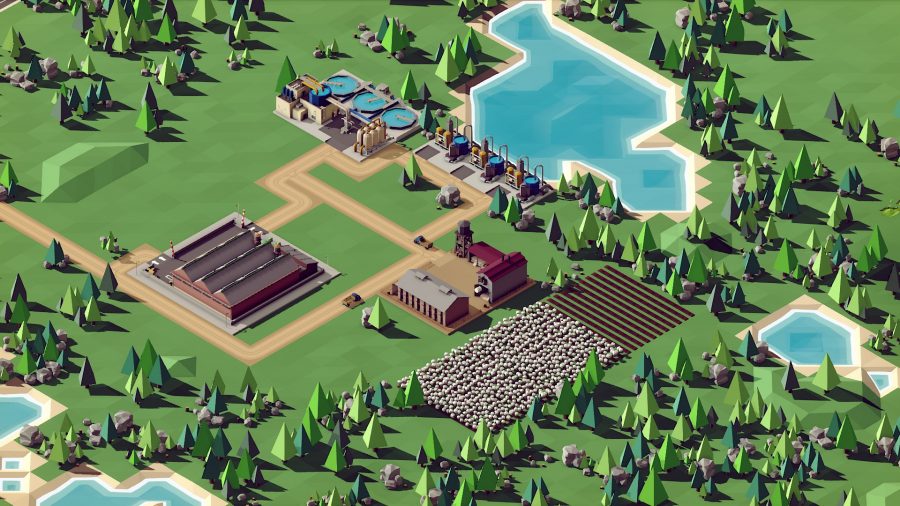Our Verdict
Although its light tutorial and lack of feedback throw it off balance, Rise of Industry’s in-depth production tools and supply chain mechanics - not to mention waffle options - will meet the demands of any production sim fan.
I’ve always dreamt of becoming a farmer, escaping to the countryside and getting the satisfaction of living off the land. That’s why, when I first started playing Rise of Industry, I immediately gravitated towards the farming lifestyle. Now, several hours later, I’ve stopped chasing that fantasy and transformed into a number-crunching management mogul.
I can plan truck routes, track profit margins, and punch numbers into a calculator so fast my fingers seem to dance over the buttons. I’ve traded my sun hat for a top hat and currently own the biggest farming industry in the region. My empire is like a patchwork blanket: fields of golden wheat, soft cotton, juicy apples, ripe oranges, and beds upon beds of sprouting vegetables are spread far and wide.
I have five farms and three plantations on the go – a modest industry size, but I can do better. As soon as I unlock flour in the technology tree I can start producing dough. Then, with the money I make from my other products, I can finally start working towards my ultimate goal: an industry built solely on the production of waffles.
Rise of Industry is all about ambition. It doesn’t have a story or missions to complete, you don’t have to look after a city in an apocalyptic winterscape or play with the intricate politics of a tropical island state. A vast land sits before you populated with cities and you have a pocket full of cash – it’s time to double it.
It’s a game of supply and demand. You gather resources, grow crops, craft items, and then sell your product to a thirsty market. You decide what you want to sell and how to produce it within the game’s management tools. That concise and simple goal at the heart of Rise of Industry is its core strength. But that’s not to say it doesn’t have complexities – you’ll be scribbling in your notebook and counting grid tiles in no time.
You begin with a procedurally generated island divided into different regions, each populated with towns and cities. Clicking on a city’s name tag gives you a list of the retail stores and the products they want. Picking a place where a city’s needs match its surrounding resources is a great place to start. As you grow your industrial empire, you’ll have to fend off competition from other businesses, quickly adapt to the game’s random events, and make sure you don’t choke the planet with your pollution.
A big part of succeeding in Rise of Industry is acquiring knowledge and reacting quickly and intelligently to it. Figuring out which products are in demand, how many potential buyers there are, and how much they’re willing to spend is the bedrock upon which you grow your riches.
It’s easy enough at first, when you can put all your focus on one or two supply chains, learning how they work at the micro scale. For example, the humble town of Moundville wants glass and is willing to pay a high margin for it. To start producing glass, you’ll need to gather sand and coal, so building a mine and a sand collector is the first thing to do. These materials are then delivered by truck to a factory that will make the glass. It’s then taken to a warehouse that houses the bulk of your produce but also acts as a distribution point to get your glass to the stores.
This simple supply chain is easy to understand but there are enough moving parts to keep you busy at the start. It’s when you begin expanding and have multiple factories, mines, farms, and drills on the go that it can all fall into a tangled mess of tracking loans, product routes, storage problems, resource availability, dispatch costs, and resource management. Welcome to my day-to-day hell.
Fortunately, with more chaos comes more organisational systems. Rise of Industry has a number of tools to help you keep track of pretty much everything.
There’s a budget overview panel with breakdowns and graphs of your money, a production overview chart displaying what you’re producing and how efficiently, a logistics routes overview, and a global market panel so you can keep an eye on the base value of every product. If you love the statistics side of management sims then all of this information is readily at your fingertips.
The problem is that you may have trouble finding these management tools. The tutorial for Rise of Industry is pretty light, only explaining the basic foundations of the game. It fails to delve into the game’s management systems and instead leaves it to you to figure it out. It even fails to mention small but helpful features like how pressing TAB on your keyboard brings up map labels that show you where certain resources are (you’re welcome to that tip), or the importance of setting an unlock queue for your tech tree.
The tutorial’s failing also highlights another issue with the game – there’s not a lot of positive feedback. When I make successful sales to a store, unlock a new option on the tech tree, or manage to make a profit for a month, there’s nothing to tell me whether it’s beneficial to me or not, or indeed that it even happened.
Small red and green numbers pop up on the map indicating income and outcome, but that’s it. Alright, there’s a money symbol in the bottom left that opens up your business statistics, but while I love a good statistics table as much as the next person, Rise of Industry needs to celebrate your empire more. Throwing up a bunch of green numbers isn’t enough.
Still, while it feels like Rise of the Industry leaves you to your own devices, it never stresses me out – largely due to the refreshing amount of freedom it allows. I don’t have to feed a desperately hungry population or prepare for waves of incoming enemies as I enjoy the rhythm of trade. It leaves the fate of the business in my capable hands and lets me get on with it. And you can too.
Related: Check out the best management games on PC
Want to specialise in home goods? You can start with gathering copper and build your way up to telephones, fridges, and ovens. Or start a textiles industry and supply the cities in your region with clothes. And if you want to create a business empire built entirely from selling waffles, it gives you the tools to do that, too – and, best of all, there’s no one to judge you for doing so.
